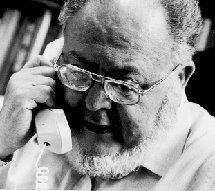Four by Herman Kahn
 It's been about three months since I posted here. I've been thinking a lot. One of the things I've been thinking about is how hard it is to have actual conversations. One reason for that is that everyone tends to "know" a lot that isn't so, as Mark Twain observed.
It's been about three months since I posted here. I've been thinking a lot. One of the things I've been thinking about is how hard it is to have actual conversations. One reason for that is that everyone tends to "know" a lot that isn't so, as Mark Twain observed.As for people who even know the name "Herman Kahn"? There must be people who can recognize that name without thinking of the Terry Southern -- Stanley Kubrick -- Peter Sellers creation, Dr. Strangelove. Until recently, I wasn't one of them. Then I actually troubled to read Kahn's On Thermonuclear War.
What Sellers & company chose to mock in Strangelove were eminently mockworthy. But it's striking how little of that I found when I actually read Kahn's book, and how much else of value I found there. In particular, the complex structure of kinds-of-deterrence he detailed made specific mention of the dangers of only having a single deterrent -- especially the real world version of the fictional "Cobal-Thorium G" Doomsday Bomb. Kahn apologized for the eight or so different aspects of the problem as he saw it, saying he didn't see any rational way to whittle the number down, and further apologized that he was not at all sure he'd covered all the bases.
The consensus nowadays is that MAD was all we ever had. If true, it's amazing we made it.
I wonder about that. I suspect that many people, both doves and hawks, caught a few words, quickly tuned him out, stopped thinking, and proceeded to listen to themselves and one another not-thinking, at a sort of "comfortable" [sic] remove from what he was actually saying. It's instructive; daunting, if I let it be.
For now, here are four quotes of worth.
On risk:
It is not true, as is often stated in Congress, that one can take no[italics as found in the original]
chances with national security. Today's world is full of risks. Still,
it is not sufficient merely to say that one is taking a calculated risk.
(The term "calculated risk," as nearly as I can see, is always used
in the sense that there is a risk of which we are aware but have not
been able to calculate.) One would like to actually calculate this
"calculated risk"---to get some numerical orientation on what
the risks are. Are we taking one chance out of a hundred that the
Russians have a disguised program we do not know about? Is it
one in ten, or one in three, or what?
P. 201, On Thermonuclear War, H. Kahn, 2nd ed w/index, Princeton U Press, 1961
On strategy, and getting beyond "playing games"/politics:
One of the characteristic weaknesses of democracy is an inability toibid, P. 343
carry out complicated long-term programs in a steadfast and competent
way.... One way to do this is to make a serious attempt to lift the level
of discussion. I believe it can be done, but only if there is on the one hand
some self-restraint on the part of those who are trying to facilitate a
program by the adept use of language and, on the other hand,
much more savage criticism and punishment for those who are caught
confusing or oversimplifying issues when it is inappropriate.
The cure will not and cannot be complete.
On The World Crisis by Churchill:
I know of no better textbook on the subject of war, prewar preparationsibid, P. 371
and peacetime risks.
Re: Korea:
I do not know if it is possible to explain to a democratic publicibid, P. 529
the rationality and necessity for being willing to fight limited wars.
If it is not possible, I predict a very dim future for democracy in our
troubled era.

0 Comments:
Post a Comment
<< Home